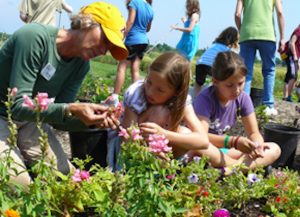Intergenerational gardening provides many benefits
Chronicle Media — April 21, 2017
Intergenerational gardening is the act of older adults passing along plant information, gardening skills, and cultural traditions to younger generations. (Photo courtesy of University of Illinois Extension)
Like many life skills, gardening is often learned directly from family members. Grandparents might recruit the grandkids to help water transplants or drop in seeds, setting the stage for a lifetime love of gardening.
“Gardening is classified as a life skill because it not only allows you to grow food for yourself and family, but it also incorporates many skills such as math, reading, science, and even history,” says University of Illinois Extension horticulture educator Bruce J. Black.
“Like many people, I got bit by the gardening bug while learning how to grow vegetables and flowers from my grandparents and my mother,” Black says. “When I was learning this skill and developing my passion, I did not realize the full benefits or how this passion would impact my life.”
Intergenerational gardening is the act of older adults passing along plant information, gardening skills, and cultural traditions to younger generations. Participants need not be related. For example, when Master Gardeners teach classes in their community, they may be engaging in intergenerational gardening.
The benefits of intergenerational gardening include:
- An increased interest in gardening in the younger generation.
- Relationships between elders and children, while helping to counteract negative stereotypes.
- Improvements in physical and mental well-being and life satisfaction in elder participants.
- A safe environment for cultural and life experience sharing.
- An exploration of skills, such as reading, math, science, geography, and life lessons, such as responsibility, accountability, life/death, and patience.
“Not everything that grows in a garden is a plant,” Black says. “Gardening is just one of the many common-ground activities where intergenerational transfers can happen. In my experiences as not only the child but also now as a garden educator, the learning opportunities do happen on both sides.”
With 35 percent of American households growing food in gardens in 2014, the opportunities for intergenerational gardening are abundant.
To learn about a volunteer opportunity that incorporates plenty of intergenerational education, check out the University of Illinois Extension’s Master Gardener Program at web.extension.illinois.edu/mg.
— Intergenerational gardening provides many benefits —




